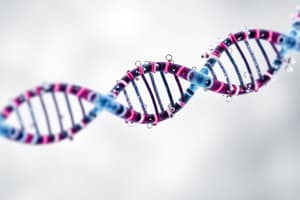Podcast
Questions and Answers
During PCR, at what temperature does DNA polymerase become activated to extend the DNA strands by adding free nucleotides?
During PCR, at what temperature does DNA polymerase become activated to extend the DNA strands by adding free nucleotides?
- 55°C
- 72°C (correct)
- 42°C
- 95°C
A researcher aims to amplify a specific DNA sequence known to be 300 base pairs long using PCR. Which component is most crucial for determining the specificity of the amplified sequence?
A researcher aims to amplify a specific DNA sequence known to be 300 base pairs long using PCR. Which component is most crucial for determining the specificity of the amplified sequence?
- The sequence of the primers used in the reaction. (correct)
- The concentration of free nucleotides in the reaction mixture.
- The type of DNA polymerase used.
- The ramp speed of the thermocycler.
In a PCR, denaturation is a crucial step. If denaturation is skipped, what is the most likely outcome?
In a PCR, denaturation is a crucial step. If denaturation is skipped, what is the most likely outcome?
- The reaction will proceed normally because denaturation is not essential.
- The DNA strands will not separate, preventing amplification. (correct)
- DNA polymerase will be unable to extend the DNA strands.
- Primers will not anneal to the DNA.
Why is Thermus aquaticus DNA polymerase (Taq polymerase) the enzyme of choice for PCR?
Why is Thermus aquaticus DNA polymerase (Taq polymerase) the enzyme of choice for PCR?
Which of the following applications of PCR is most directly related to preventing the transmission of infectious diseases?
Which of the following applications of PCR is most directly related to preventing the transmission of infectious diseases?
Flashcards
Polymerase Chain Reaction (PCR)
Polymerase Chain Reaction (PCR)
A technology to amplify DNA, producing billions of copies from one strand.
PCR Process
PCR Process
Involves denaturation, annealing, and extension to amplify DNA.
Denaturation
Denaturation
The first step in PCR where DNA is heated to 95°C to separate strands.
Taq Polymerase
Taq Polymerase
Signup and view all the flashcards
Thermocycler
Thermocycler
Signup and view all the flashcards
Study Notes
Polymerase Chain Reaction (PCR)
- PCR is a biomedical technology used to amplify short lengths of DNA by copying it multiple times.
- PCR can produce billions of copies from a single DNA strand.
PCR Process
- Denaturation: DNA is heated to 95°C to separate the two strands.
- Annealing: The temperature is cooled to 55°C allowing primers – short DNA sequences – to bind to the separated DNA strands.
- Extension: The temperature rises to 72°C, this activates DNA polymerase, which adds free nucleotides to the DNA strands extending the primer sequences.
- The process repeats for up to 30 cycles resulting in an exponential increase in the number of DNA copies.
PCR Applications
- Tissue Typing: Determine compatibility for organ transplants.
- Detecting Oncogenes: Analyze tumor DNA for mutations and develop specific treatment plans.
- Detecting Mutations in Embryos: Identify genetic mutations in embryos during IVF.
- Detecting Mutations in Fetal DNA: Detect genetic mutations in a fetus through a maternal blood sample.
- Identifying Viral or Bacterial Infections: Detect specific viral or bacterial DNA in a sample (e.g., a swab).
- Monitoring the Spread of Infectious Diseases: Track the spread of viruses and bacteria.
- Forensic Science: Use DNA fragments found at a crime scene to create a DNA profile.
- Research: Used in a variety of research areas, including synthetic biology.
Key Components of PCR
- Primers: Short DNA sequences that bind to the target DNA, directing the polymerase to amplify a specific region.
- DNA Polymerase: Enzyme responsible for adding free nucleotides to the DNA strand during the extension phase.
Taq Polymerase
- A heat-stable DNA polymerase enzyme isolated from the bacterium Thermus aquaticus.
- Thermus aquaticus thrives in hot environments, giving its proteins thermostability.
- Taq polymerase can withstand high temperatures (95°C) for extended periods, making it ideal for PCR.
- It adds nucleotides to the DNA strand at a rate of about 100 base pairs per second at 72°C.
Thermocycler
- Performs PCR automatically.
- Changes the temperature of the reaction mixture based on a pre-programmed cycle.
- Often includes three stages: denaturation, annealing, and extension.
Studying That Suits You
Use AI to generate personalized quizzes and flashcards to suit your learning preferences.




